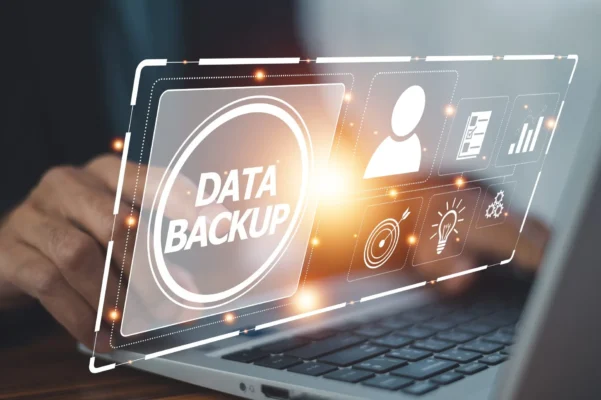Data has become one of the most valuable assets in the digital age. Computers, smartphones, and external hard drives are where we store everything from personal photos and videos to important professional documents and financial information. While technology makes storing and accessing files easier, it also introduces more risks. Devices can be damaged, stolen, or infected with viruses, leading to data loss. The importance of carefully backing up your data is therefore clear. Backups simply store copies of your data in a separate location so they can be restored in the event of a problem.
The Importance of Data Backup
Many people don’t realize how easily digital data can be compromised. Your phone could be damaged or lost, your hard drive could fail, or hackers could attack your device with malware. Without backups, the loss of years of memories, work, or company information can occur instantly. When organizations lose customer data, they can lose money and damage their reputation. Losing family photos or schoolwork can be very stressful. Backing up your data is more than just a technical precaution; it’s a way to protect the most important information in your personal and professional life.
The Dangers of Not Backing Up Your Data
Not backing up your data exposes you to numerous risks. One of the most common causes of data loss is hardware failure. No matter how new or expensive your device is, it can break down at any moment. Cyberthreats pose another major risk, particularly ransomware, which locks your files until you pay a ransom to the hacker. Natural disasters, accidents, or theft can lead to permanent data loss. Without backups, even something as simple as accidentally deleting a file can cause serious problems. These risks emphasize the importance of secure backups.
Different Ways to Store Data
There are many ways to back up your data, each with its own advantages and disadvantages. External hard drives and USB drives are popular because they make it simple to open and save files. Cloud backup services are also very popular because they allow you to store files online and access them from anywhere. Businesses often use network storage solutions, which provide enhanced security. For added security, some people choose to use multiple methods. Choose a strategy that works for you and ensure your backups are secure and up-to-date.
Cloud Backup and Its Features
Cloud storage is one of the most secure and widely used data backup methods. Google Drive, iCloud, and Dropbox are all online storage services that securely store your files and allow you to access them from multiple devices. One significant benefit of cloud backup is its ability to distribute your data across multiple devices. This means you can still access your information even if your computer or phone breaks. Automatic syncing, a feature of many cloud services, instantly updates your data when you make changes. This ease of use makes cloud backup an ideal choice for individuals and organizations.
The Features of External Hard Drives
While cloud storage is useful, external hard drives remain an excellent way to back up your data. They offer enormous storage space and don’t require an internet connection to keep your data safe. Many people choose to use external internal drives to store sensitive files because they can be disconnected from their devices when not in use. This reduces the risk of hackers stealing data. However, accidents or natural disasters can damage these hard drives, making it crucial to ensure their security. By combining an external hard drive with other backup methods, you can keep your data even safer.
Why Testing Backups Is Important
Many people make the mistake of creating a backup and never testing it. Backups are only useful when necessary. Files might not copy correctly, or the storage device might become damaged. By regularly testing your backups, you ensure they are working properly and data recovery is guaranteed. This phase is crucial for businesses that can’t afford the disruption caused by inaccessible or lost files. By checking your backups, you can ensure your safety net is reliable.
Data Backup for Businesses
For businesses, backing up data isn’t just a beneficial idea; it’s a necessity. Customer data, financial records, and internal communications are crucial for many companies. Losing this information can lead to financial losses, legal repercussions, and even a loss of trust. Many companies utilize professional backup services, offering both cloud and physical storage. These services often have automated mechanisms to ensure file security at all times. Investing in secure backups protects both your business and your customers. In today’s digital economy, developing good backup habits is crucial for building trust and reliability.
Backing Up Your Personal Data
Secure backup habits can pay off significantly. You might think your personal photos, movies, and school or work files aren’t relevant until you lose them. Creating a backup plan is simple and can safeguard your memories for years to come. Many people set up automatic cloud backups on their phones to ensure their files and photos are always safe. Some people prefer to back up their files offline on external hard drives. Consistency is key. One of the easiest ways to protect your digital life is to make it a habit to back up your files regularly.
Conclusion
One of the most important ways to protect your digital life is to back up your data. Devices can break, hackers can attack, and accidents can happen unexpectedly. With a reliable backup, you can restore files and continue working or enjoying your digital content without data loss. Whether you use cloud storage, an external device, or both, backing up regularly is crucial. Securely backing up your data not only keeps your important files safe but also provides peace of mind. In an age where data is more valuable than ever, secure backups are no longer a luxury; they are a necessity.
FAQs
1. What does data backup mean?
Data backup means backing up your important files and storing them in a safe place so they can be recovered if lost.
2. Is cloud backup or an external hard drive better?
Both are useful. Cloud backups are easy to use and access, but external hard drives give you physical control over your data. It’s best to use both.
3. How often should I back up my files?
That depends entirely on how often you change your files. Someone who uses their computer for fun might back up weekly or monthly, while businesses should back up daily or even constantly.
4. Is backing up data expensive?
Not always. Many cloud providers offer free plans with limited storage capacity, and you can also get external hard drives at a lower price.
5. Can hackers access backups?
If you don’t take any security measures, then the answer is yes. You can mitigate the risk of backup hacking by implementing encryption, strong passwords, and secure storage methods.




